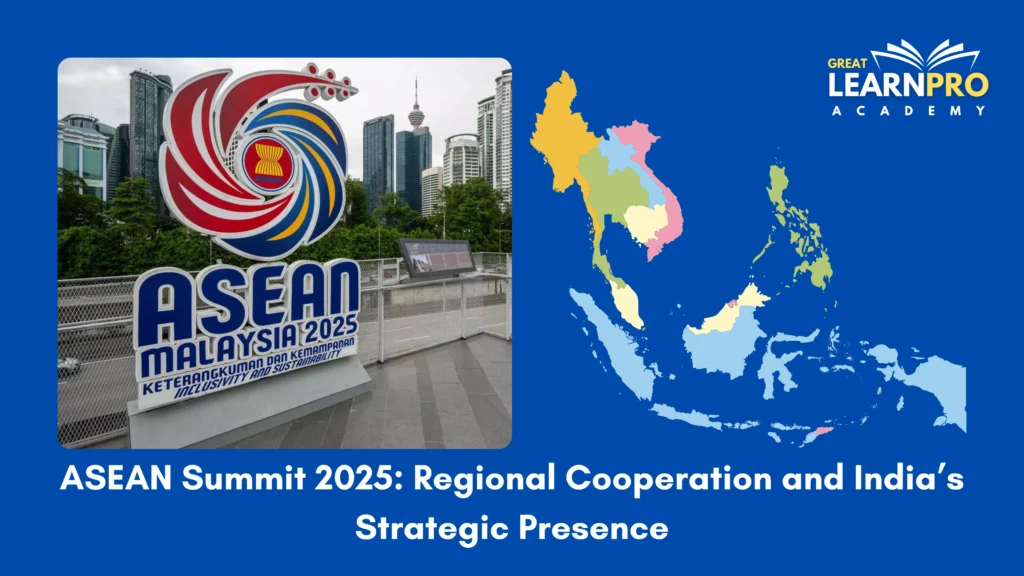What is ASEAN?
The Association of Southeast Asian Nations (ASEAN) is a regional intergovernmental organization comprising ten countries Brunei, Cambodia, Indonesia, Laos, Malaysia, Myanmar, the Philippines, Singapore, Thailand, and Vietnam. Established in 1967, its primary aim is to promote economic growth, social progress, cultural development, and regional stability among its members.
ASEAN plays a crucial role in facilitating cooperation in political, economic, security, and socio-cultural fields, while also serving as a central platform for dialogue and engagement with external powers such as India, the United States, China, Japan, Australia, and Russia.
The ASEAN Summit is the highest decision-making body of the organization, where heads of state and government meet to chart the future direction of the association, discuss regional challenges, and strengthen partnerships with dialogue partners.

The 47th ASEAN Summit: October 26–28, 2025
The 47th ASEAN Summit and Related Meetings will be held in Kuala Lumpur, Malaysia, from October 26 to 28, 2025. Malaysia, as the ASEAN Chair for 2025, has chosen the theme “Inclusivity and Sustainability.” The theme emphasizes the importance of ensuring that economic development, technological growth, and environmental protection benefit all member countries equitably, leaving no nation or community behind.
This year’s summit will see participation from the leaders of all ten ASEAN member states and several key external partners, including India, the United States, Japan, Australia, China, South Korea, and Russia. The meetings will also coincide with the East Asia Summit (EAS) a broader forum that includes ASEAN plus major global partners, providing a stage for discussion on global and regional stability.
Key topics likely to dominate discussions include economic integration and trade connectivity, digital transformation, renewable energy transition, climate action, maritime cooperation, and security challenges in the South China Sea. The Summit will also focus on enhancing resilience against global economic disruptions and ensuring sustainable recovery in the post-pandemic era.
India’s Attendance and Strategic Role
India, though not a member of ASEAN, is one of its most significant dialogue partners and a vital part of the ASEAN-India Strategic Partnership. Prime Minister Narendra Modi is expected to attend the Summit in Kuala Lumpur, reaffirming India’s commitment to its “Act East Policy,” which aims to strengthen political, economic, and cultural relations with Southeast Asia.
India’s participation in the ASEAN Summit is crucial for multiple reasons. First, it provides an opportunity for India to enhance its cooperation with ASEAN on maritime security, counter-terrorism, digital economy, and climate change adaptation. Second, it enables India to engage in high-level bilateral meetings with ASEAN member states and major partners like the United States, Japan, and Australia, to discuss regional connectivity, defence partnerships, and trade expansion.
India is also expected to highlight initiatives that support the theme of “Inclusivity and Sustainability,” such as renewable energy collaborations, clean technology exchange, and digital inclusion projects. By engaging deeply in the ASEAN process, India aims to strengthen regional stability, ensure a rules-based maritime order, and promote peace and prosperity in the Indo-Pacific region.
Significance of the 2025 Summit
The 47th ASEAN Summit comes at a critical time for the region. As the world faces rising geopolitical tensions, shifting trade patterns, and environmental challenges, ASEAN continues to serve as a stabilizing force. The summit is expected to address issues such as maritime disputes in the South China Sea, energy transition cooperation, and digital connectivity projects that will bind the region more closely together.
For India, the summit is more than just a diplomatic engagement—it is a strategic opportunity. India views ASEAN as central to its Indo-Pacific vision and as a key partner in maintaining freedom of navigation, promoting economic resilience, and advancing sustainable development. The Summit provides India with a valuable platform to project its global leadership, voice regional concerns, and strengthen its presence in Southeast Asia through a cooperative and inclusive approach.
The participation of major world leaders at the Summit underscores its global importance. The discussions and declarations emerging from this meeting will influence future regional policies, trade partnerships, and cooperative mechanisms across the Indo-Pacific.
Conclusion
The ASEAN Summit 2025 in Kuala Lumpur represents a defining moment for regional diplomacy. With its focus on inclusivity, sustainability, and stability, the summit aims to reaffirm ASEAN’s centrality in global affairs. India’s participation reinforces its strategic intent to build strong economic, political, and security linkages with Southeast Asia.
As the region continues to navigate new challenges and opportunities, the outcomes of this year’s ASEAN Summit will be closely watched across the world. It will not only shape the future of Southeast Asian cooperation but also influence India’s evolving role as a key stakeholder in the Indo-Pacific narrative.
Sources:
- https://www.reuters.com/world/asia-pacific/thailand-cambodia-sign-ceasefire-asean-summit-malaysia-minister-says-2025-10-14/?utm_
- https://apnews.com/article/02b681e9c3914eb763859c3634e910d6?utm_
- https://www.myasean2025.my/event/47th-asean-summit-and-related-summits/?utm_
More Current affairs: https://learnproacademy.in/updates/
